Event Management: Tourism Impact and Sustainable Events Analysis
VerifiedAdded on 2023/01/05
|7
|1936
|53
Essay
AI Summary
This essay provides a literature review on the impact of event management on tourism and socio-economic conditions, particularly within developing countries. It examines the economic benefits and social impacts of the tourism industry, highlighting both positive and negative effects. The essay discusses the role of "green" and "sustainable" events in promoting tourism and their influence on economic and social factors. It explores the challenges and hidden costs associated with tourism, such as revenue distribution and infrastructure limitations. The analysis considers the effects of tourism on local cultures, including the potential loss of traditions. The paper concludes by emphasizing the importance of event management in tourism development and suggests future research directions, focusing on sustainable event practices.
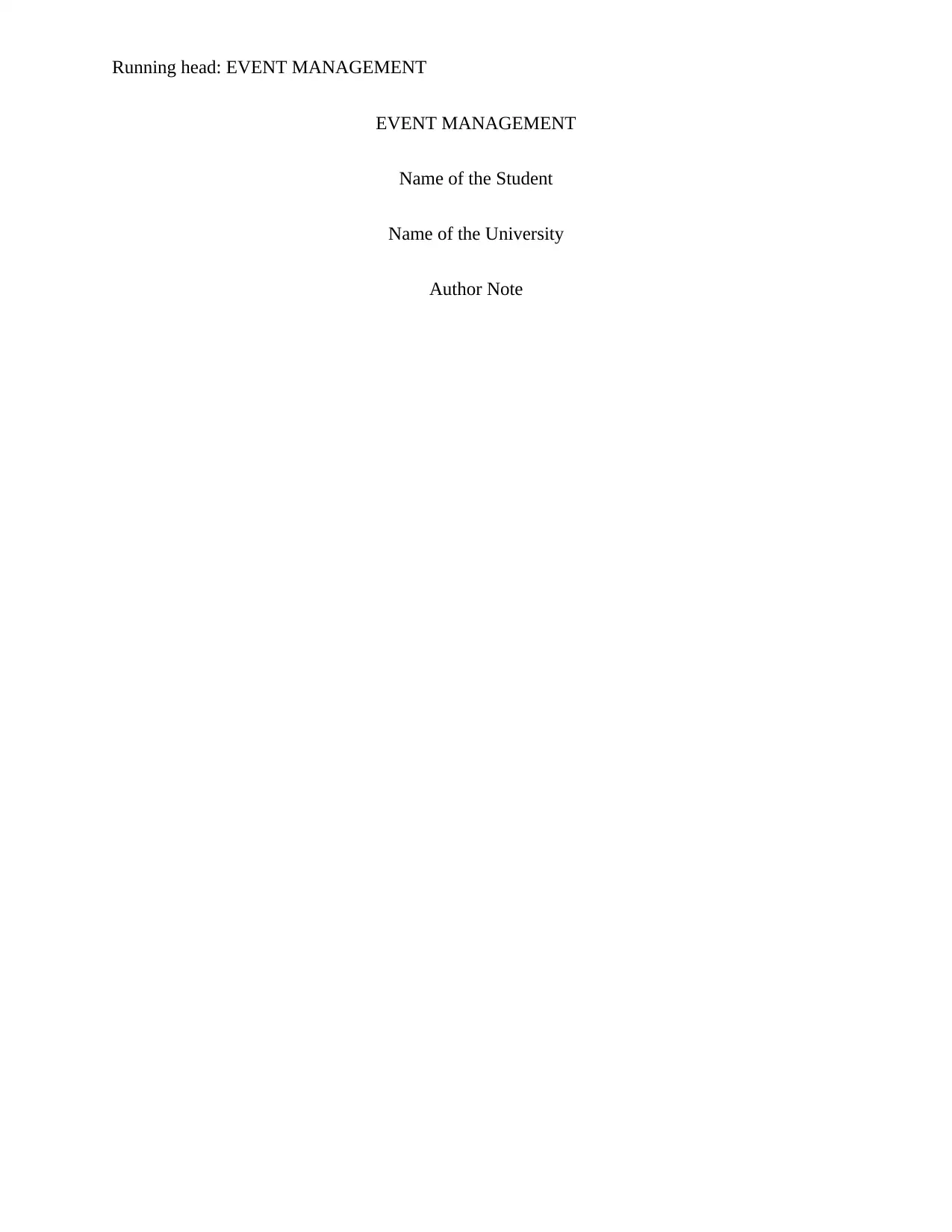
Running head: EVENT MANAGEMENT
EVENT MANAGEMENT
Name of the Student
Name of the University
Author Note
EVENT MANAGEMENT
Name of the Student
Name of the University
Author Note
Paraphrase This Document
Need a fresh take? Get an instant paraphrase of this document with our AI Paraphraser
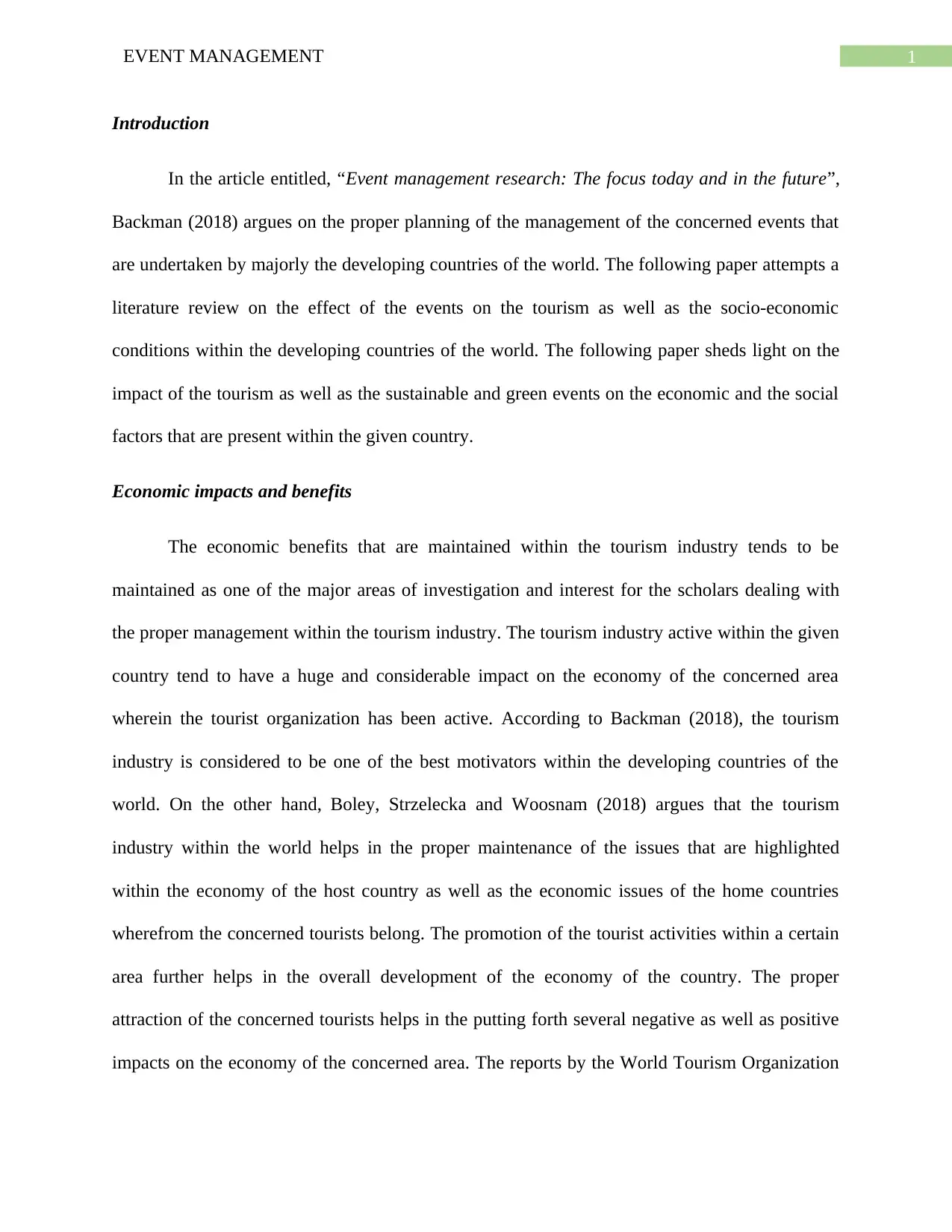
1EVENT MANAGEMENT
Introduction
In the article entitled, “Event management research: The focus today and in the future”,
Backman (2018) argues on the proper planning of the management of the concerned events that
are undertaken by majorly the developing countries of the world. The following paper attempts a
literature review on the effect of the events on the tourism as well as the socio-economic
conditions within the developing countries of the world. The following paper sheds light on the
impact of the tourism as well as the sustainable and green events on the economic and the social
factors that are present within the given country.
Economic impacts and benefits
The economic benefits that are maintained within the tourism industry tends to be
maintained as one of the major areas of investigation and interest for the scholars dealing with
the proper management within the tourism industry. The tourism industry active within the given
country tend to have a huge and considerable impact on the economy of the concerned area
wherein the tourist organization has been active. According to Backman (2018), the tourism
industry is considered to be one of the best motivators within the developing countries of the
world. On the other hand, Boley, Strzelecka and Woosnam (2018) argues that the tourism
industry within the world helps in the proper maintenance of the issues that are highlighted
within the economy of the host country as well as the economic issues of the home countries
wherefrom the concerned tourists belong. The promotion of the tourist activities within a certain
area further helps in the overall development of the economy of the country. The proper
attraction of the concerned tourists helps in the putting forth several negative as well as positive
impacts on the economy of the concerned area. The reports by the World Tourism Organization
Introduction
In the article entitled, “Event management research: The focus today and in the future”,
Backman (2018) argues on the proper planning of the management of the concerned events that
are undertaken by majorly the developing countries of the world. The following paper attempts a
literature review on the effect of the events on the tourism as well as the socio-economic
conditions within the developing countries of the world. The following paper sheds light on the
impact of the tourism as well as the sustainable and green events on the economic and the social
factors that are present within the given country.
Economic impacts and benefits
The economic benefits that are maintained within the tourism industry tends to be
maintained as one of the major areas of investigation and interest for the scholars dealing with
the proper management within the tourism industry. The tourism industry active within the given
country tend to have a huge and considerable impact on the economy of the concerned area
wherein the tourist organization has been active. According to Backman (2018), the tourism
industry is considered to be one of the best motivators within the developing countries of the
world. On the other hand, Boley, Strzelecka and Woosnam (2018) argues that the tourism
industry within the world helps in the proper maintenance of the issues that are highlighted
within the economy of the host country as well as the economic issues of the home countries
wherefrom the concerned tourists belong. The promotion of the tourist activities within a certain
area further helps in the overall development of the economy of the country. The proper
attraction of the concerned tourists helps in the putting forth several negative as well as positive
impacts on the economy of the concerned area. The reports by the World Tourism Organization
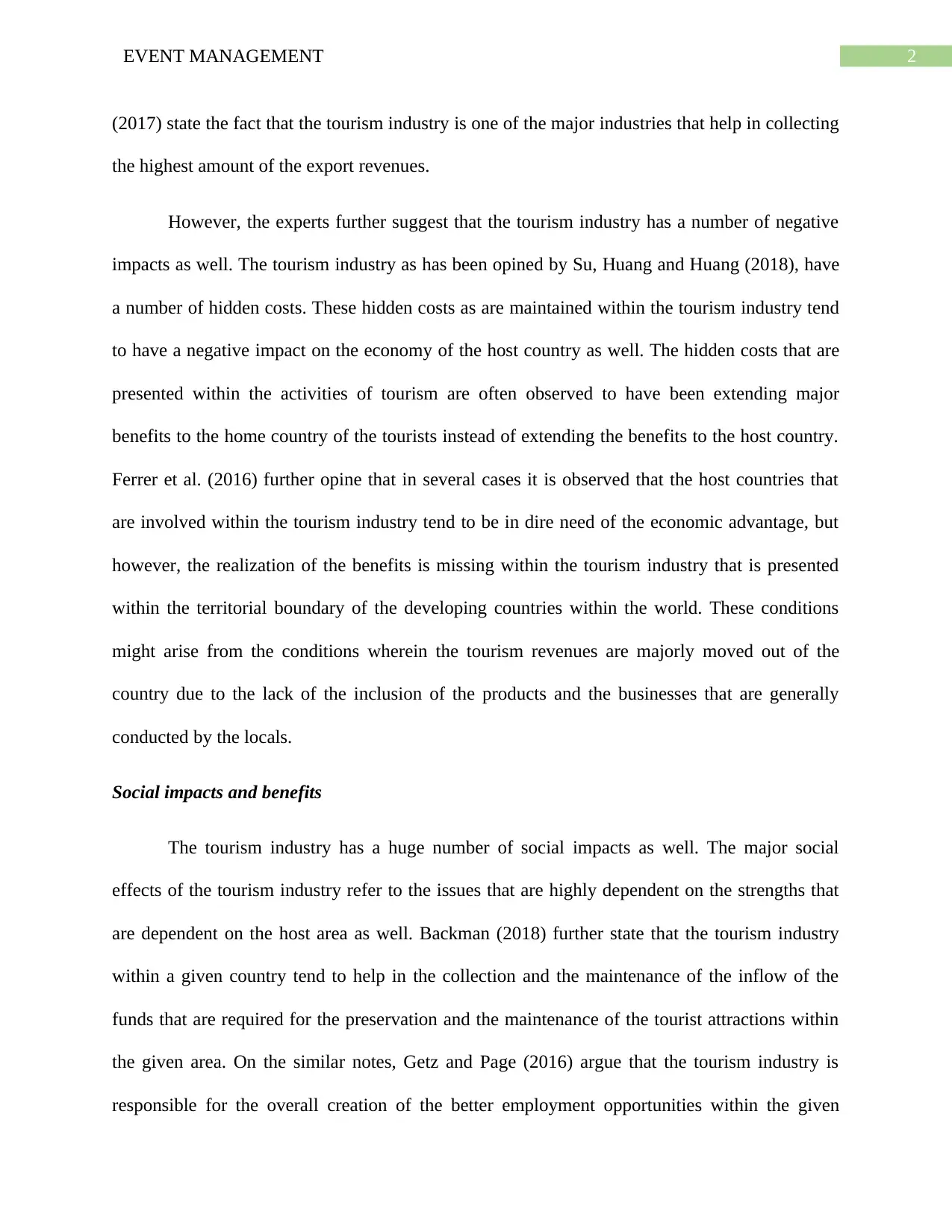
2EVENT MANAGEMENT
(2017) state the fact that the tourism industry is one of the major industries that help in collecting
the highest amount of the export revenues.
However, the experts further suggest that the tourism industry has a number of negative
impacts as well. The tourism industry as has been opined by Su, Huang and Huang (2018), have
a number of hidden costs. These hidden costs as are maintained within the tourism industry tend
to have a negative impact on the economy of the host country as well. The hidden costs that are
presented within the activities of tourism are often observed to have been extending major
benefits to the home country of the tourists instead of extending the benefits to the host country.
Ferrer et al. (2016) further opine that in several cases it is observed that the host countries that
are involved within the tourism industry tend to be in dire need of the economic advantage, but
however, the realization of the benefits is missing within the tourism industry that is presented
within the territorial boundary of the developing countries within the world. These conditions
might arise from the conditions wherein the tourism revenues are majorly moved out of the
country due to the lack of the inclusion of the products and the businesses that are generally
conducted by the locals.
Social impacts and benefits
The tourism industry has a huge number of social impacts as well. The major social
effects of the tourism industry refer to the issues that are highly dependent on the strengths that
are dependent on the host area as well. Backman (2018) further state that the tourism industry
within a given country tend to help in the collection and the maintenance of the inflow of the
funds that are required for the preservation and the maintenance of the tourist attractions within
the given area. On the similar notes, Getz and Page (2016) argue that the tourism industry is
responsible for the overall creation of the better employment opportunities within the given
(2017) state the fact that the tourism industry is one of the major industries that help in collecting
the highest amount of the export revenues.
However, the experts further suggest that the tourism industry has a number of negative
impacts as well. The tourism industry as has been opined by Su, Huang and Huang (2018), have
a number of hidden costs. These hidden costs as are maintained within the tourism industry tend
to have a negative impact on the economy of the host country as well. The hidden costs that are
presented within the activities of tourism are often observed to have been extending major
benefits to the home country of the tourists instead of extending the benefits to the host country.
Ferrer et al. (2016) further opine that in several cases it is observed that the host countries that
are involved within the tourism industry tend to be in dire need of the economic advantage, but
however, the realization of the benefits is missing within the tourism industry that is presented
within the territorial boundary of the developing countries within the world. These conditions
might arise from the conditions wherein the tourism revenues are majorly moved out of the
country due to the lack of the inclusion of the products and the businesses that are generally
conducted by the locals.
Social impacts and benefits
The tourism industry has a huge number of social impacts as well. The major social
effects of the tourism industry refer to the issues that are highly dependent on the strengths that
are dependent on the host area as well. Backman (2018) further state that the tourism industry
within a given country tend to help in the collection and the maintenance of the inflow of the
funds that are required for the preservation and the maintenance of the tourist attractions within
the given area. On the similar notes, Getz and Page (2016) argue that the tourism industry is
responsible for the overall creation of the better employment opportunities within the given
⊘ This is a preview!⊘
Do you want full access?
Subscribe today to unlock all pages.

Trusted by 1+ million students worldwide
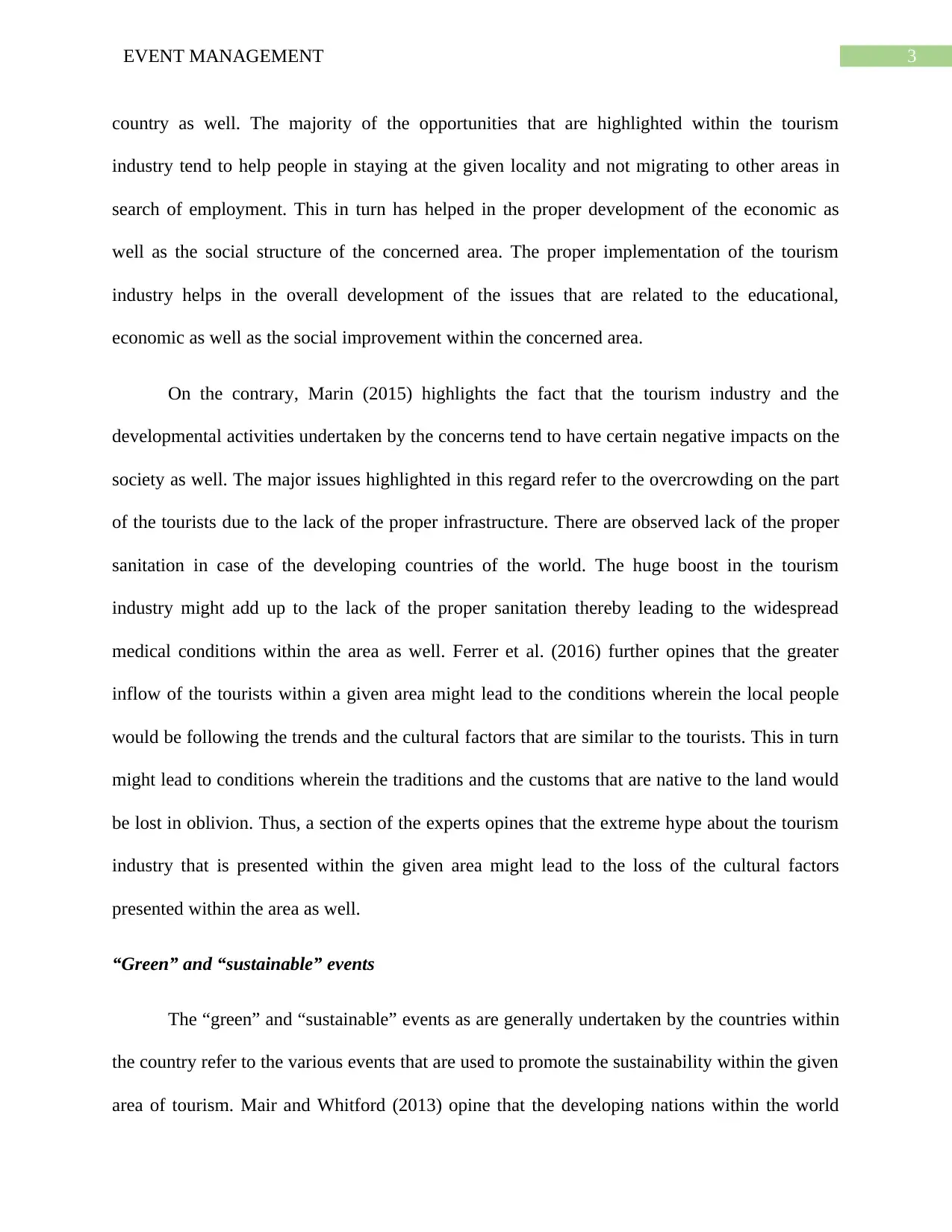
3EVENT MANAGEMENT
country as well. The majority of the opportunities that are highlighted within the tourism
industry tend to help people in staying at the given locality and not migrating to other areas in
search of employment. This in turn has helped in the proper development of the economic as
well as the social structure of the concerned area. The proper implementation of the tourism
industry helps in the overall development of the issues that are related to the educational,
economic as well as the social improvement within the concerned area.
On the contrary, Marin (2015) highlights the fact that the tourism industry and the
developmental activities undertaken by the concerns tend to have certain negative impacts on the
society as well. The major issues highlighted in this regard refer to the overcrowding on the part
of the tourists due to the lack of the proper infrastructure. There are observed lack of the proper
sanitation in case of the developing countries of the world. The huge boost in the tourism
industry might add up to the lack of the proper sanitation thereby leading to the widespread
medical conditions within the area as well. Ferrer et al. (2016) further opines that the greater
inflow of the tourists within a given area might lead to the conditions wherein the local people
would be following the trends and the cultural factors that are similar to the tourists. This in turn
might lead to conditions wherein the traditions and the customs that are native to the land would
be lost in oblivion. Thus, a section of the experts opines that the extreme hype about the tourism
industry that is presented within the given area might lead to the loss of the cultural factors
presented within the area as well.
“Green” and “sustainable” events
The “green” and “sustainable” events as are generally undertaken by the countries within
the country refer to the various events that are used to promote the sustainability within the given
area of tourism. Mair and Whitford (2013) opine that the developing nations within the world
country as well. The majority of the opportunities that are highlighted within the tourism
industry tend to help people in staying at the given locality and not migrating to other areas in
search of employment. This in turn has helped in the proper development of the economic as
well as the social structure of the concerned area. The proper implementation of the tourism
industry helps in the overall development of the issues that are related to the educational,
economic as well as the social improvement within the concerned area.
On the contrary, Marin (2015) highlights the fact that the tourism industry and the
developmental activities undertaken by the concerns tend to have certain negative impacts on the
society as well. The major issues highlighted in this regard refer to the overcrowding on the part
of the tourists due to the lack of the proper infrastructure. There are observed lack of the proper
sanitation in case of the developing countries of the world. The huge boost in the tourism
industry might add up to the lack of the proper sanitation thereby leading to the widespread
medical conditions within the area as well. Ferrer et al. (2016) further opines that the greater
inflow of the tourists within a given area might lead to the conditions wherein the local people
would be following the trends and the cultural factors that are similar to the tourists. This in turn
might lead to conditions wherein the traditions and the customs that are native to the land would
be lost in oblivion. Thus, a section of the experts opines that the extreme hype about the tourism
industry that is presented within the given area might lead to the loss of the cultural factors
presented within the area as well.
“Green” and “sustainable” events
The “green” and “sustainable” events as are generally undertaken by the countries within
the country refer to the various events that are used to promote the sustainability within the given
area of tourism. Mair and Whitford (2013) opine that the developing nations within the world
Paraphrase This Document
Need a fresh take? Get an instant paraphrase of this document with our AI Paraphraser
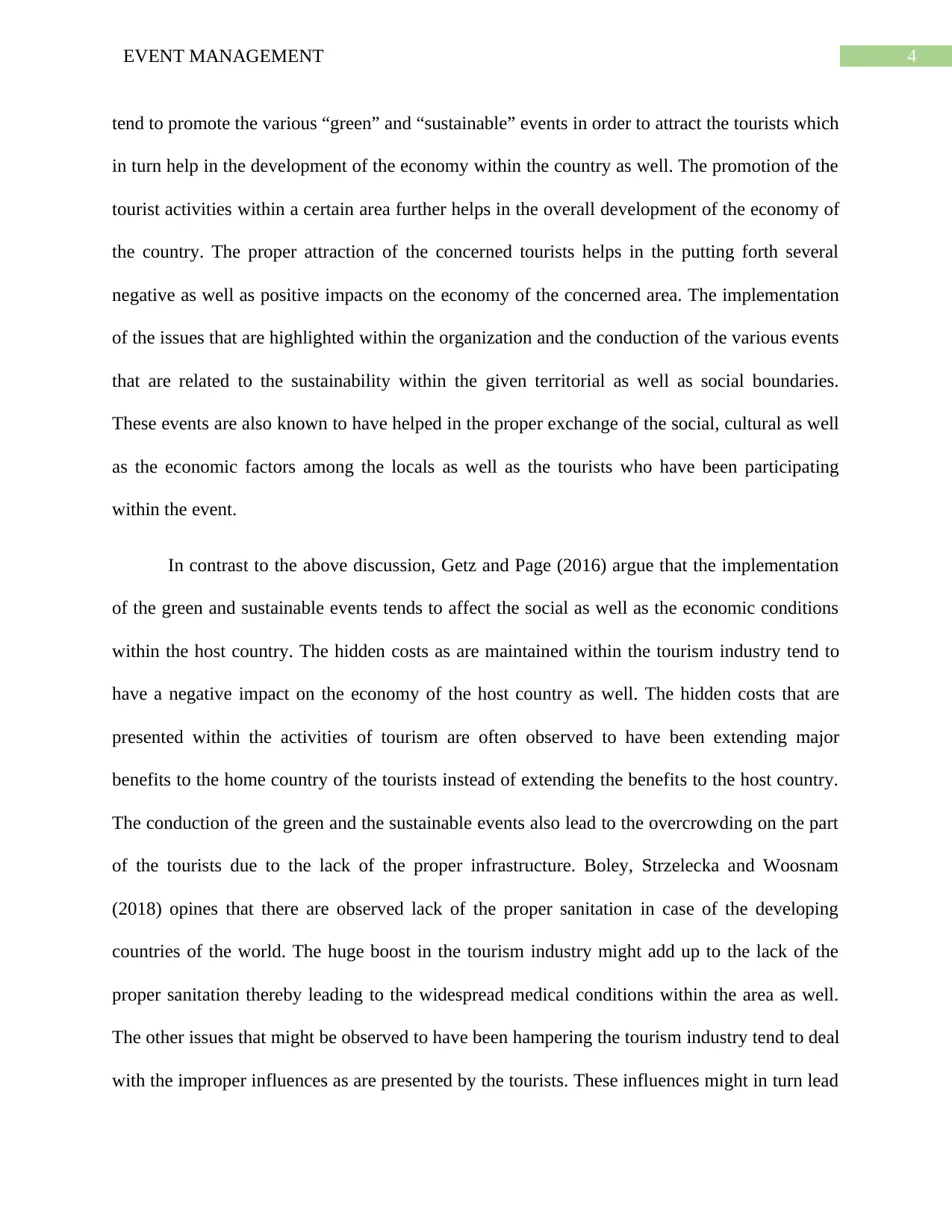
4EVENT MANAGEMENT
tend to promote the various “green” and “sustainable” events in order to attract the tourists which
in turn help in the development of the economy within the country as well. The promotion of the
tourist activities within a certain area further helps in the overall development of the economy of
the country. The proper attraction of the concerned tourists helps in the putting forth several
negative as well as positive impacts on the economy of the concerned area. The implementation
of the issues that are highlighted within the organization and the conduction of the various events
that are related to the sustainability within the given territorial as well as social boundaries.
These events are also known to have helped in the proper exchange of the social, cultural as well
as the economic factors among the locals as well as the tourists who have been participating
within the event.
In contrast to the above discussion, Getz and Page (2016) argue that the implementation
of the green and sustainable events tends to affect the social as well as the economic conditions
within the host country. The hidden costs as are maintained within the tourism industry tend to
have a negative impact on the economy of the host country as well. The hidden costs that are
presented within the activities of tourism are often observed to have been extending major
benefits to the home country of the tourists instead of extending the benefits to the host country.
The conduction of the green and the sustainable events also lead to the overcrowding on the part
of the tourists due to the lack of the proper infrastructure. Boley, Strzelecka and Woosnam
(2018) opines that there are observed lack of the proper sanitation in case of the developing
countries of the world. The huge boost in the tourism industry might add up to the lack of the
proper sanitation thereby leading to the widespread medical conditions within the area as well.
The other issues that might be observed to have been hampering the tourism industry tend to deal
with the improper influences as are presented by the tourists. These influences might in turn lead
tend to promote the various “green” and “sustainable” events in order to attract the tourists which
in turn help in the development of the economy within the country as well. The promotion of the
tourist activities within a certain area further helps in the overall development of the economy of
the country. The proper attraction of the concerned tourists helps in the putting forth several
negative as well as positive impacts on the economy of the concerned area. The implementation
of the issues that are highlighted within the organization and the conduction of the various events
that are related to the sustainability within the given territorial as well as social boundaries.
These events are also known to have helped in the proper exchange of the social, cultural as well
as the economic factors among the locals as well as the tourists who have been participating
within the event.
In contrast to the above discussion, Getz and Page (2016) argue that the implementation
of the green and sustainable events tends to affect the social as well as the economic conditions
within the host country. The hidden costs as are maintained within the tourism industry tend to
have a negative impact on the economy of the host country as well. The hidden costs that are
presented within the activities of tourism are often observed to have been extending major
benefits to the home country of the tourists instead of extending the benefits to the host country.
The conduction of the green and the sustainable events also lead to the overcrowding on the part
of the tourists due to the lack of the proper infrastructure. Boley, Strzelecka and Woosnam
(2018) opines that there are observed lack of the proper sanitation in case of the developing
countries of the world. The huge boost in the tourism industry might add up to the lack of the
proper sanitation thereby leading to the widespread medical conditions within the area as well.
The other issues that might be observed to have been hampering the tourism industry tend to deal
with the improper influences as are presented by the tourists. These influences might in turn lead
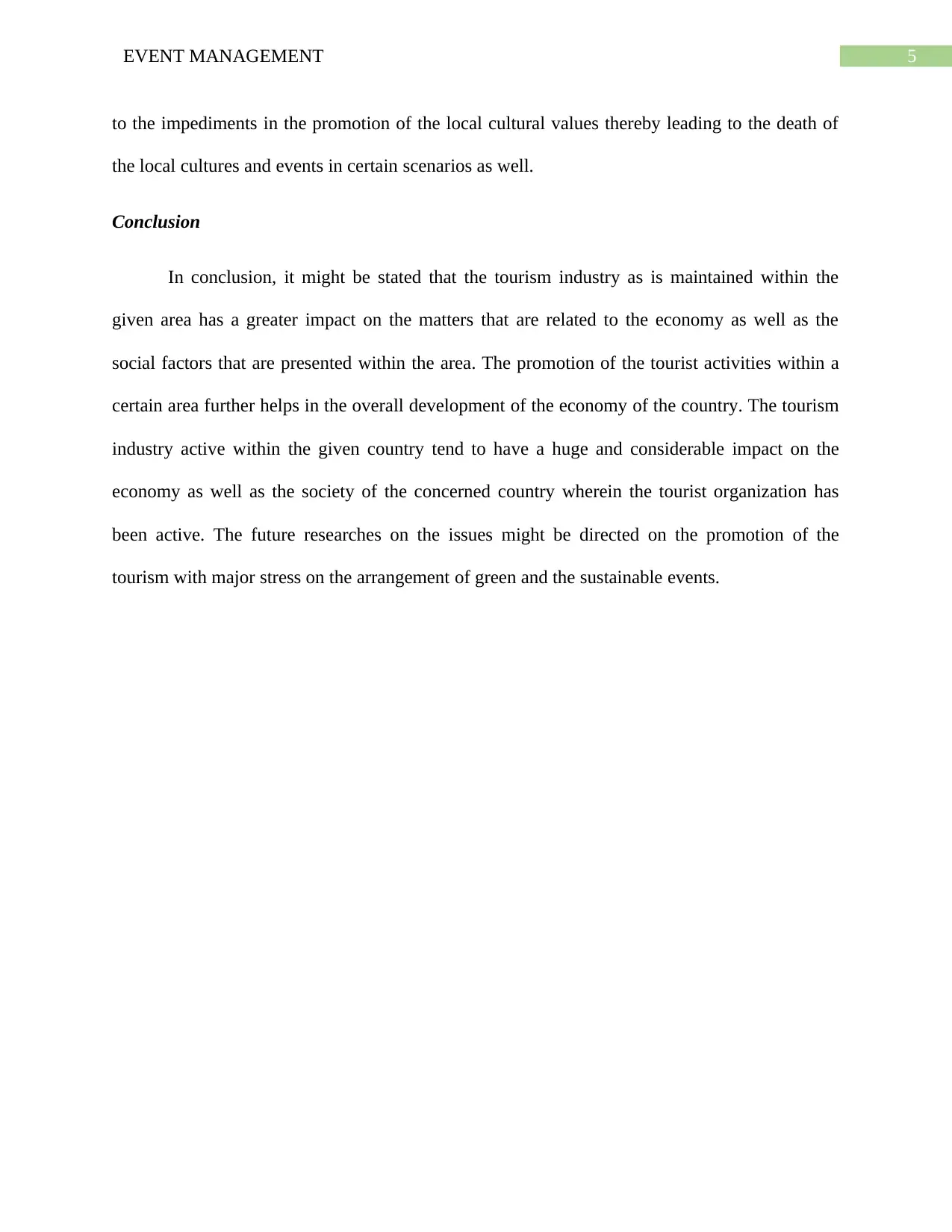
5EVENT MANAGEMENT
to the impediments in the promotion of the local cultural values thereby leading to the death of
the local cultures and events in certain scenarios as well.
Conclusion
In conclusion, it might be stated that the tourism industry as is maintained within the
given area has a greater impact on the matters that are related to the economy as well as the
social factors that are presented within the area. The promotion of the tourist activities within a
certain area further helps in the overall development of the economy of the country. The tourism
industry active within the given country tend to have a huge and considerable impact on the
economy as well as the society of the concerned country wherein the tourist organization has
been active. The future researches on the issues might be directed on the promotion of the
tourism with major stress on the arrangement of green and the sustainable events.
to the impediments in the promotion of the local cultural values thereby leading to the death of
the local cultures and events in certain scenarios as well.
Conclusion
In conclusion, it might be stated that the tourism industry as is maintained within the
given area has a greater impact on the matters that are related to the economy as well as the
social factors that are presented within the area. The promotion of the tourist activities within a
certain area further helps in the overall development of the economy of the country. The tourism
industry active within the given country tend to have a huge and considerable impact on the
economy as well as the society of the concerned country wherein the tourist organization has
been active. The future researches on the issues might be directed on the promotion of the
tourism with major stress on the arrangement of green and the sustainable events.
⊘ This is a preview!⊘
Do you want full access?
Subscribe today to unlock all pages.

Trusted by 1+ million students worldwide
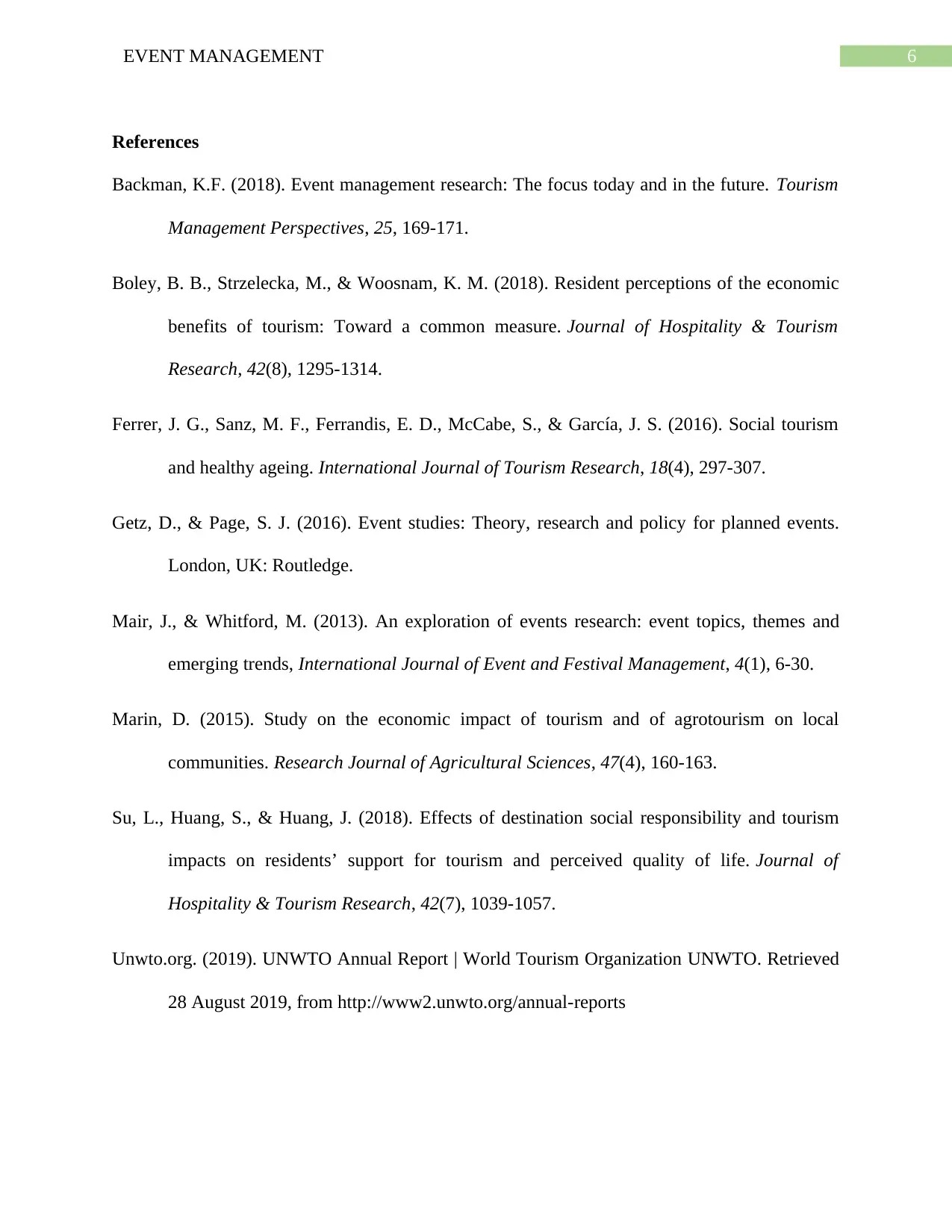
6EVENT MANAGEMENT
References
Backman, K.F. (2018). Event management research: The focus today and in the future. Tourism
Management Perspectives, 25, 169-171.
Boley, B. B., Strzelecka, M., & Woosnam, K. M. (2018). Resident perceptions of the economic
benefits of tourism: Toward a common measure. Journal of Hospitality & Tourism
Research, 42(8), 1295-1314.
Ferrer, J. G., Sanz, M. F., Ferrandis, E. D., McCabe, S., & García, J. S. (2016). Social tourism
and healthy ageing. International Journal of Tourism Research, 18(4), 297-307.
Getz, D., & Page, S. J. (2016). Event studies: Theory, research and policy for planned events.
London, UK: Routledge.
Mair, J., & Whitford, M. (2013). An exploration of events research: event topics, themes and
emerging trends, International Journal of Event and Festival Management, 4(1), 6-30.
Marin, D. (2015). Study on the economic impact of tourism and of agrotourism on local
communities. Research Journal of Agricultural Sciences, 47(4), 160-163.
Su, L., Huang, S., & Huang, J. (2018). Effects of destination social responsibility and tourism
impacts on residents’ support for tourism and perceived quality of life. Journal of
Hospitality & Tourism Research, 42(7), 1039-1057.
Unwto.org. (2019). UNWTO Annual Report | World Tourism Organization UNWTO. Retrieved
28 August 2019, from http://www2.unwto.org/annual-reports
References
Backman, K.F. (2018). Event management research: The focus today and in the future. Tourism
Management Perspectives, 25, 169-171.
Boley, B. B., Strzelecka, M., & Woosnam, K. M. (2018). Resident perceptions of the economic
benefits of tourism: Toward a common measure. Journal of Hospitality & Tourism
Research, 42(8), 1295-1314.
Ferrer, J. G., Sanz, M. F., Ferrandis, E. D., McCabe, S., & García, J. S. (2016). Social tourism
and healthy ageing. International Journal of Tourism Research, 18(4), 297-307.
Getz, D., & Page, S. J. (2016). Event studies: Theory, research and policy for planned events.
London, UK: Routledge.
Mair, J., & Whitford, M. (2013). An exploration of events research: event topics, themes and
emerging trends, International Journal of Event and Festival Management, 4(1), 6-30.
Marin, D. (2015). Study on the economic impact of tourism and of agrotourism on local
communities. Research Journal of Agricultural Sciences, 47(4), 160-163.
Su, L., Huang, S., & Huang, J. (2018). Effects of destination social responsibility and tourism
impacts on residents’ support for tourism and perceived quality of life. Journal of
Hospitality & Tourism Research, 42(7), 1039-1057.
Unwto.org. (2019). UNWTO Annual Report | World Tourism Organization UNWTO. Retrieved
28 August 2019, from http://www2.unwto.org/annual-reports
1 out of 7
Related Documents
Your All-in-One AI-Powered Toolkit for Academic Success.
+13062052269
info@desklib.com
Available 24*7 on WhatsApp / Email
![[object Object]](/_next/static/media/star-bottom.7253800d.svg)
Unlock your academic potential
Copyright © 2020–2026 A2Z Services. All Rights Reserved. Developed and managed by ZUCOL.



